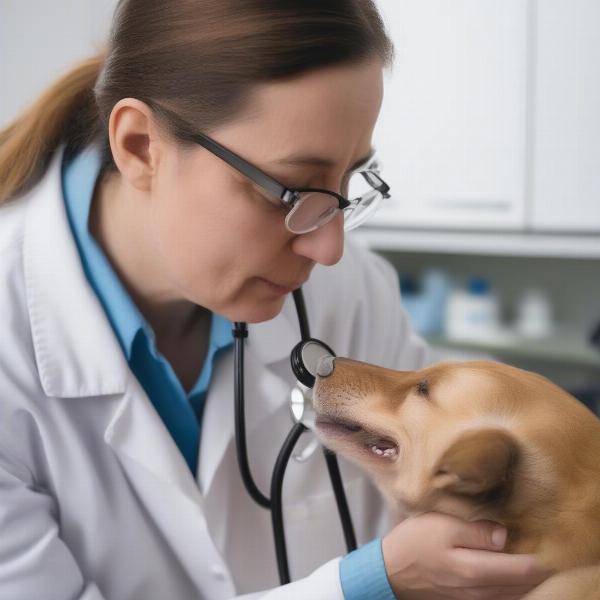Robitussin is a common over-the-counter medication used to treat coughs and colds in humans. However, many pet owners wonder if it’s safe and effective for their canine companions. The question of “robitussin dogs dosage” is frequently searched online, highlighting the concern and need for accurate information. This article addresses this important topic, providing crucial insights into the use of Robitussin in dogs, including potential risks and safer alternatives. It’s vital to remember that you should never administer any medication to your dog without first consulting with your veterinarian.
Understanding Robitussin and its Ingredients
Robitussin comes in various formulations, each containing different active ingredients. Some contain guaifenesin, an expectorant that helps loosen mucus and phlegm in the airways. Others include dextromethorphan (DXM), a cough suppressant. Only Robitussin formulations containing ONLY guaifenesin are potentially safe for dogs, and even then, only under strict veterinary guidance. Formulations containing DXM, pseudoephedrine, or acetaminophen are toxic to dogs and can cause severe side effects, even death.
Why Robitussin Dosage for Dogs is Tricky
Determining the correct robitussin dogs dosage is challenging and requires professional veterinary advice. The appropriate dosage varies depending on the dog’s weight, health condition, and the specific formulation of Robitussin. Administering the wrong dosage can lead to adverse reactions, including vomiting, diarrhea, lethargy, and even seizures.
Safer Alternatives to Robitussin for Dogs
Several safer and more effective alternatives to Robitussin are available for treating coughs in dogs. Your veterinarian can recommend appropriate medications based on your dog’s specific condition. These options might include prescription cough suppressants, antihistamines, or even natural remedies like honey (in small amounts). Always prioritize consulting your vet before giving any medication to your dog.
When to Consult Your Veterinarian
If your dog is coughing, it’s crucial to consult your veterinarian to determine the underlying cause. A cough can be a symptom of various conditions, ranging from kennel cough to heart disease. Never attempt to self-treat your dog’s cough with Robitussin or any other human medication. Prompt veterinary attention is essential for accurate diagnosis and treatment.
 Veterinarian Examining a Dog
Veterinarian Examining a Dog
The Dangers of Self-Medicating Your Dog
Self-medicating your dog with Robitussin or any human medication can be extremely dangerous. Even if the formulation contains only guaifenesin, incorrect dosages can have adverse effects. Moreover, the underlying cause of the cough may require a different treatment approach altogether.
“Never give your dog human medication without consulting a veterinarian,” advises Dr. Emily Carter, DVM, a leading expert in canine respiratory health. “What might be safe for humans can be toxic to dogs, and even seemingly harmless medications can have serious consequences if not administered correctly.”
Recognizing Signs of Robitussin Toxicity in Dogs
If you suspect your dog has ingested Robitussin, especially a formulation containing DXM, pseudoephedrine, or acetaminophen, watch out for signs of toxicity. These include vomiting, diarrhea, lethargy, incoordination, tremors, seizures, and difficulty breathing. If you observe any of these symptoms, seek immediate veterinary attention.
Conclusion
While some pet owners may be tempted to use Robitussin to treat their dog’s cough, it’s crucial to understand the potential risks. Only Robitussin formulations containing ONLY guaifenesin might be considered, and even then, only under strict veterinary supervision. The safest and most effective approach is to consult your veterinarian for an accurate diagnosis and appropriate treatment. Never self-medicate your dog with robitussin dogs dosage, as it can have serious consequences.
FAQ
- Is Robitussin safe for dogs? Only formulations containing ONLY guaifenesin are potentially safe, and only under veterinary guidance. Formulations with DXM, pseudoephedrine, or acetaminophen are toxic.
- What is the correct robitussin dogs dosage? The dosage must be determined by a veterinarian based on the dog’s individual needs.
- What are the signs of Robitussin toxicity in dogs? Vomiting, diarrhea, lethargy, incoordination, tremors, seizures, and difficulty breathing.
- What should I do if my dog has ingested Robitussin? Contact your veterinarian immediately.
- What are some safer alternatives to Robitussin for dogs? Your vet can recommend prescription cough suppressants, antihistamines, or natural remedies.
- Can I give my dog Robitussin DM? No, Robitussin DM contains dextromethorphan (DXM), which is toxic to dogs.
- Why is it important to consult a vet for a dog’s cough? A cough can indicate various underlying conditions requiring specific treatment.
ILM Dog is a leading online resource for dog owners worldwide, providing expert advice on all aspects of dog care, from breed selection and health to training, nutrition, and grooming. We’re dedicated to helping you provide the best possible care for your furry friend. For further information on dog health and well-being, explore our website at ILM Dog. Contact us at [email protected] or +44 20-3965-8624 for personalized guidance.